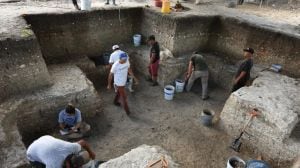India wakes up: we condemn Maoist violence, they have to lay down arms
After maintaining a bewildering silence over the past few days and sending conflicting signals on its ties with Nepal, New Delhi today final...

After maintaining a bewildering silence over the past few days and sending conflicting signals on its ties with Nepal, New Delhi today finally woke up to say that its policy towards the Maoists had undergone no change and that it still condemns its violence.
This was timed with a formal denial from CPM General Secretary Prakash Karat that he had held no meeting with Nepalese Maoist leader Baburam Bhattarai.
Reports that ‘‘I have met a Maoist leader from Nepal in a meeting arranged by the Indian security agencies is untrue…no such meeting was held,’’ the statement said.
Meanwhile, Delhi said it condemns the ‘‘terrorist’’ and ‘‘violent’’ activities of the CPN (Maoists) which have caused ‘‘enormous suffering’’ to the people of Nepal. Though India has taken a decision to resume military aid to the Royal Nepal Army, sources said the supplies have been restricted to non-lethal material like jeeps and night-vision devices. ‘‘It is our conviction that that there is no purely military solution to the Maoist insurgency,’’ said the MEA spokesperson.
He added that durable peace and stability in Nepal could only be achieved through a political settlement, which requires the Maoists to ‘‘forswear armed struggle’’ and ‘‘lay down their arms’’. India also emphasised its commitment to supporting all efforts at restoring peace, political stability and economic prosperity.
In Kathmandu, Joint Secretary in-charge of Nepal Ranjit Rae met Nepalese Foreign Secretary Madhuraman Acharya. He underlined the Indian position on the Maoists and made it clear that New Delhi viewed constitutional monarchy and multi-party democracy as the twin pillars of political stability in Nepal.
Rae reached Kathmandu today on a five-day visit and will also travel to the Indian consulate at Birgunj in southern Nepal, where India has helped build a dry port. He will then go to Dharan before wrapping up his visit. Besides the functions he has to attend, the visit will be an opportunity to make an assessment of the situation there.






- 01
- 02
- 03
- 04
- 05

























